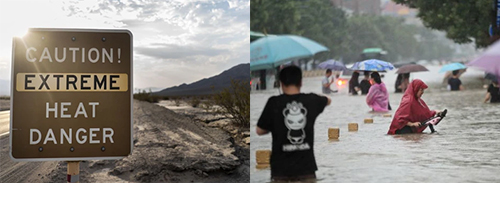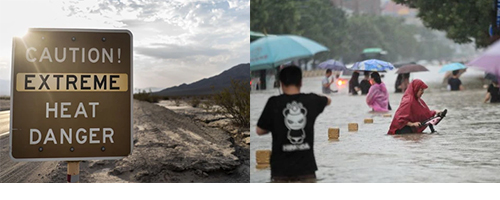-
In recent weeks, many records have been broken.
We aren’t referring to the Tokyo Olympics but to record-setting heat, floods and fires in many parts of the world. Record heat in western North America, record rainfall in Germany and the Benelux countries, and near-record rainfall in Henan Province, China remind us that, as many scientists had predicted, extreme weather events are becoming more intense due to climate change.
Record heat in western North America, record rainfall in Germany and the Benelux countries, and near-record rainfall in Henan Province, China remind us that, as many scientists had predicted, extreme weather events are becoming more intense due to climate change. The extreme weather events align with the contention by many scientists that the “Greenhouse Effect” of trapped CO2 in the atmosphere is the root cause of rising weather volatility.

The extreme weather events align with the contention by many scientists that the “Greenhouse Effect” of trapped CO2 in the atmosphere is the root cause of rising weather volatility. A recent UN report, Human Cost of Disasters, notes that improved reporting and recording in recent years partly explains an increase in disasters over the last 20 years (2000-2019) compared to the previous 20-year (1980-1999) period. However, most of the increase is due to a sharp “rise in the number of climate-related disasters” categorized as meteorological, climatological, or hydrological.
The extreme heat has led to dry conditions, making vast areas of western North America, Australia, South America, and Southern Europe more prone to wildfires that occur more frequently and earlier in the season. While the fires cause significant haze and poor air quality in nearby urban areas, in recent weeks smoke from over 80 large, active forest fires in the western North America have reached the Atlantic coast, some 2,800 miles away.
As noted in our May 2021 Sustainability Themes Take Center Stage report, extreme temperatures “are forcing buildings and infrastructure to face conditions well outside their design parameters.” During the recent heat wave in western North America, roads cracked and buckled in some areas, unable to withstand several days of record-breaking heat. While roads can be built to withstand extreme temperatures or other variants of a local climate, building for extreme heat was never considered in areas that rarely experience it. Similarly, the death toll from the heat wave in western North America was due in large part to the fact that many households in British Columbia and the Pacific Northwest do not have air conditioning, as temperatures rarely hit a point where air conditioning is needed.
Residents of coastal cities have long been aware that flooding is the most pressing manifestation of changing climate patterns and are thinking about ways to minimize flood risk. The Dutch and Danish governments have devised elaborate systems of barriers and water management to protect coastal cities from rising sea levels and storm surges.
The pandemic continues to be front-of-mind around the world as COVID-19 variants remain ever-present, in most countries. Rising vaccination levels could allow a phased re-opening of economies and a palpable sense that a return to normal is imminent. At the same time, extreme weather events in recent weeks remind us that the post-COVID world will not be the same as the pre-pandemic one.
This will not be the last time that our research team will be reporting on extreme weather and its impact on real estate. We believe that the events of the last two months represent the beginning of a long journey. At LaSalle, we are integrating climate risk analysis into our underwriting and portfolio reviews of managed assets. The research, risk management, and sustainability teams at LaSalle have joined forces to bring the latest scientific analysis and projections for future climate change directly to our investment teams. This journey requires an understanding of which risks are covered by insurance or mitigated through physical improvements, and which cannot. This is a journey that all real estate investors must eventually take.

Apr 01, 2025
Working backwards: Dealing with unprecedented policy uncertainty
In this period of elevated policy uncertainty, real estate investors should focus on what they can and should do amidst all the noise.




